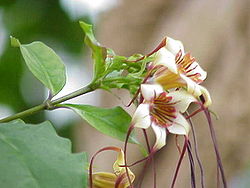Strophanthus
| Features: | ✓ | evergreen |
|---|
If this plant info box on watering; zones; height; etc. is mostly empty you can click on the edit tab and fill in the blanks!
Strophanthus is a genus of 35-40 species of flowering plants in the family Apocynaceae, native mainly to tropical Africa, extending to South Africa, with a few species in Asia, from southern India to the Philippines and southern China. The name (strophos anthos, "twisted cord flower") derives from the long twisted threadlike segments of the corolla, which in one species (S. preussii) attain a length of 30–35 cm.
The genus includes vines, shrubs and small trees. The leaves are opposite or whorled, simple broad lanceolate, 2–20 cm long, with an entire margin.
Several of the African tribes used Strophanthus as the principal ingredient in arrow poison.
Read about Strophanthus in the Standard Cyclopedia of Horticulture
|
|---|
|
Strophanthus (Greek, twisted cord and flower, alluding to the corolla-segms.). Incl. Roupellia. Apocynaceae. Shrubs, often scandent, glabrous or more or less hairy, with persistent or deciduous foliage, suitable for the warmhouse: lvs. opposite, rarely ternate: infl. terminal, often at the ends of short branches, corymbose, many- or few-fld. or reduced to solitary fls.: fls. mostly showy; sepals 5, imbricate, sometimes foliaceous; corolla funnelform or campanulate, tube cylindrical, long or short, mouth with paired appendages alternating with the lobes which are 5, acuminate and produced into very long filiform tails; disk none: mericarps 2, follicular, oblong or fusiform, divaricate.—About 40 species, Trop. and S. Afr. and Trop. Asia. S. dichotomus, DC. Erect shrub with stout branches: lvs. elliptic-oblong or obovate, 3-5 1/2 x 2-3 in., obtuse, acute or apiculate, rather coriaceous: cymes much shorter than the lvs., dichotomous, few-fld.: sepals subulate from an ovate base; corolla-tube and throat 3/4 - 1 in. long, whitish tails 5-7 in. long, purple: follicles very large, 8 x 2 in., divergent. India, Malaya, and Java. H.U. 2, p. 225. —S. grandiflorus, Stapf (S. Petersianus var. grandiflorus, N. E. Br.). Dense shrub, 5-6 ft. high, with long, slender, reddish brown branches: lvs. ovate to elliptic-oblong, shortly acuminate, 2-3 x 3/4-1 in., membranous: cymes terminal on leafy branches, usually reduced to a single fl.: sepals oblong to lanceolate-oblong, erect; corolla wide, purplish without, milk-white or creamy within, the lobes ovate, produced to filiform tails about 6 in. long. Trop. and S. Afr. B.M. 7390.—S. gratus, Franch. (Roupellia grata, Wall. & Hook.). Small glabrous tree or shrub: lvs. oblong, short-acuminate, base obtuse or subacute, leathery: cymes terminal, sessile, few- to 12-fld.: fls. white or tinged with pink, large; sepals broad, oblong or obovate; corolla-tube 1 1/2 in. long, lobes broad, obovate, 3/4-1 in. long; ovary glabrous: follicles obtusely acuminate. Trop. Afr. B.M. 4466. G.C. III. 28:151. J.F. 1:16.—S. Ledienii, Stein. Shrub, with softly and sparingly pubescent branches, brown when young: lvs. obovate, abruptly cuspidate, cuneate at the base: cymes sessile, terminal, 3-7-fld.: sepals linear from an elliptic base, acute; corolla-tube pale yellow, the lobes deep yellow, ovate, 6-8 in. long, including the tails: follicles slender, brown, mottled with yellow, coriaceous. Trop. Afr. Gt. 36:1241.—S. Preussii, Engl. & Pax. Rambling or climbing shrub, up to 12 ft. high: branches glabrous, brown or red-brown: lvs. elliptic or oblong to obovate or ovate, abruptly acuminate, 2-5 x 1 1/2-2 in.: cymes terminal, corymbose, many-fld.: sepals linear-oblong or linear; corolla cream-colored to orange with purple spots and streaks in the throat and purple tails, the lobes ovate, suddenly constricted and produced into tails 1 ft. long. Trop. Afr. B.M. 8250.—S. speciosus, Reber (S. capensis, A. DC.). Glabrous, rambling shrub: branches trailing on other shrubs, sometimes running high up, olive-green: lvs. in whorls of 3-4, rarely the uppermost opposite, oblong-lanceolate to lanceolate, acute, rarely acuminate, 1 1/2 – 3 1/2 x 1/2 - 1 in., leathery: cymes terminal or pseudo-axillary, corymbiform, few- to 12-fld.: sepals lanceolate to linear, sometimes recurved; corolla cream-colored to yellow or orange spotted with red, the lobes attenuate from a somewhat broader base into linear spreading tails about 1-1 1/2 in. long: follicles very slender, lanceolate, about 6 in. long. S. Afr. CH
|
Cultivation
Propagation
Pests and diseases
Species
- Strophanthus aambe
- Strophanthus alterniflorus
- Strophanthus amboensis
- Strophanthus annamensis
- Strophanthus arboreus
- Strophanthus arnoldianus
- Strophanthus aurantiacus
- Strophanthus barteri
- Strophanthus bequaertii
- Strophanthus boivinni
- Strophanthus brevicaudatus
- Strophanthus bullenianus
- Strophanthus capensis
- Strophanthus caudatus (tropical Asia)
- Strophanthus chinensis (southern China, Vietnam)
- Strophanthus congoensis
- Strophanthus courmontii
- Strophanthus cumingii
- Strophanthus dichotomus
- Strophanthus divaricatus (southern China; { Vietnam)
- Strophanthus eminii (east Africa; poison: e-strophanthin)
- Strophanthus glabra
- Strophanthus gratus (tropical west Africa; poison: ouabain, g-strophanthin)
- Strophanthus hispidus (Togo, Cameroon)
- Strophanthus laurifolinus
- Strophanthus kombe (east Africa; poison: k-strophanthin)
- Strophanthus nicholsoni
- Strophanthus petersianus (tropical Africa)
- Strophanthus preussii (tropical west Africa)
- Strophanthus sarmentosus (tropical Africa)
- Strophanthus scandens (Mallacca)
- Strophanthus speciosus (South Africa)
- Strophanthus thallone
- Strophanthus vanderijstii
- Strophanthus welwitschii
Gallery
References
External links
- w:Strophanthus. Some of the material on this page may be from Wikipedia, under the Creative Commons license.
- Strophanthus QR Code (Size 50, 100, 200, 500)
